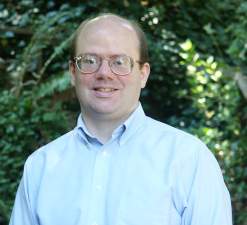Gentle expert guidance
When you're a cofounder of Wikipedia, what do you do for an encore? If you're Larry Sanger, the answer is simple: you build another Wikipedia. A better one.
This is Sanger's dream as he ramps up the Citizendium project, an ambitious undertaking that aims to reform the "immature" Wikipedia community and create a different sort of place, one where real-world accomplishments are rewarded and experts have a special role to play. Citizendium has as its goal nothing less than the creation of a comprehensive and dependable encyclopedia, the sort of place where readers can put their trust in approved articles and children can browse without stumbling upon, for instance, "Hybristophilia."
"Wikipedia has accomplished great things, but the world can do even better," Sanger said when he launched the pilot version of the "Citizen's Compendium" (the genesis of the name "Citizendium") on October 17, 2006. With experts leading the way, the new site would "improve upon Wikipedia's extremely useful, but often uneven work. The result will be not only enormous and free, but reliable."
Sanger, who says that he "literally quiver[s] with excitement" when he thinks about the possibilities of open and collaborative content, wants to make it quite clear that he is not denigrating the wisdom of the unwashed masses. Citizendium will not be a dictatorship of experts but will create a space for "gentle expert guidance" that Wikipedia does not. Sanger summed up his approach in an October speech at SDForum in San Jose, arguing the thesis that "experts can play special roles in Web 2.0 projects without 'breaking' such projects."

Larry Sanger
So can Citizendium do to Wikipedia what Wikipedia did to Britannica? At the moment, only eight Citizendium articles are listed as "approved" by editors. One is on Barbara McClintock; another covers "wheat." Clearly, work remains.
I talked with Sanger recently about his vision for the Citizendium. Despite a head cold, he was courteous, articulate, and utterly convinced that "gentle expert guidance" could create an encyclopedia capable of whipping Wikipedia in a bar fight (not that the more mature Citizendium community would ever engage in something as juvenile as a bar fight). But where had the idea for Citizendium come from the first place, and why was a Wikipedia cofounder so down on that project's prospects?
As Sanger tells it, the turning point came when he received a phone call from a man accused of murder.
"Serious and endemic problems"
The caller was John Seigenthaler, a journalist and former Robert Kennedy aide who had recently complained about a libelous Wikipedia entry accusing him of murder. The claim was false, of course, but it had survived on Wikipedia for more than 100 days.
The material was traced back to one Brian Chase of Nashville, who had added it as a "gag." Seigenthaler was not amused and began calling around to find out exactly how such an accusation had been published for so long on such a prominent website. One of the people he reached was Larry Sanger.
Sanger was laid off from Wikipedia back in 2002, and soon stopped all active involvement with the project. He returned to teaching philosophy and playing the fiddle, and he dabbled with ideas for future open content projects, including one that approximated the Citizendium. And then John Seigenthaler called him, looking for answers.
"When Seigenthaler called, I was already resigned to the necessity of making a competitor to Wikipedia," Sanger says. "The effect of Seigenthaler's call was to make me feel to some extent personally responsible for the injustice that Wikipedia was causing, which made my motivation only stronger. When after six to nine months I saw that Wikipedia wasn't going to make any significant changes, it became clear that it was on me to organize a better alternative, if I could."
In September 2006, Sanger issued his manifesto, a document called "Toward a Compendium of Knowledge." In it, he laid out the "serious and endemic problems" that he saw in the Wikipedia model:
- The community does not enforce its own rules effectively or consistently
- Widespread anonymity has a problem—it's attractive to people who want to cause trouble, undermine the project, or simply troll
- The community has developed an insularity that makes it difficult for people who are not already part of the community to get on board
- The "arguably dysfunctional community" is not attractive to traditional experts such as academics
Sanger had hoped that Wikipedia would clean up its act, and he was all but certain that the encyclopedia would eventually put an expert review system in place. After Seigenthaler's call, Sanger found the Wikipedia community's response "completely unacceptable" and concluded that they were no longer able to change in important ways.
Sanger took a risk in the fall of last year. He left his job at the Digital Universe Foundation, where he had been working on other open content projects, and launched Citizendium as a pilot project. By the end of January 2007, the project had signed up more than 500 individually-screened people to work as authors and editors, and then opened its doors to public participation (though it's still officially in the pilot phase, anyone can now sign up for an account and start writing).
The theory of "gentle expert guidance" faced its first major test.
 Download the PDF
Download the PDF
(This feature for Premier subscribers only.)
reader comments